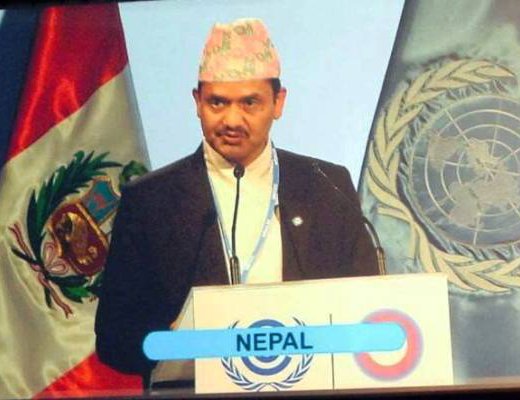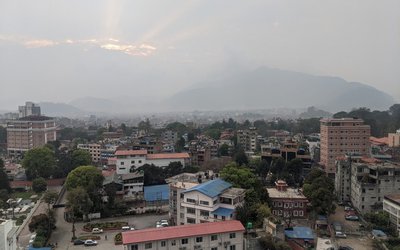
Dr.Govinda Raj Pokharel, Nepalese head of delegation for climate talks and vice chairman of National Planning Commission - made his joint statement on the first day of the high-level segment, revising the SAARC group that has been in hibernation for the last three years.
For the first time in its history, all nation of South Asian Association of Regional Cooperation come together with a voice in UN Climate talks as South Asia is particularly prone to climate change and related disasters.
In its history of last decades, climate change appear as a common agenda to bring them together in international negotiations. According to media report from Lima, capital of Peru, the SAARC group has finally come as a joint force at the ongoing climate talks with ministers and key representatives of all eight member countries formally sealing the existence of the South Asia as a common entity here as far as putting across their united stand at the UN forum is concerned.
Nepal has made a joint statement on behalf of the SAARC, bringing out the South Asia's common position which strictly adhere to the basic principles of the UNFCCC and its Kyoto Protocol.
The countries - India, Pakistan, Bangladesh, Sri Lanka, Bhutan, Nepal, Maldives and Afghanistan - jointly asked the rich nation to fulfil their promise of emission cuts during pre-2020 phase (second commitment period of Kyoto Protocol) as this move only would convince the rest of the world about their intention and commitment post-2020 based on the next year's global climate deal.
All the member countries formally agreed to make a joint statement on behalf of the SAARC during a dinner meeting of ministers\representatives of eight countries last week.
Nepalese head of delegation for climate talks - the country's planning commission vice chairman Govinda Pokharel - made his joint statement on the first day of the high-level segment, revising the group that has been in hibernation for the last three years.
Not only that, all the eight countries also agreed to send their key representatives to New Delhi for a joint conference on climate change issues for South Asian countries for four days, beginning December 16.
Making the joint statement Pokharel noted that the SAARC leaders underlined theurgency for the global community to arrive at a Protocol, another legal instrument, or an "agreed outcome with legal force applicable to all by the end of 2015, based on theprinciple of Common but Differentiated Responsibility (CBDR), Respective Capabilities and Equity under the UNFCCC".
Reflecting the group's common position, he said, "Any delay in action on climate change will only add to our costs and the requirement of Adaptation. Therefore, Pre‐2020 ambitionand ratification of Kyoto Protocol 2nd Commitment Period is the urgent need of the hour".
He also emphasised, "We must work out a post‐2020 framework that is based on equity, CBDR‐RC and protects the poor and vulnerable people in South Asia from thedisastrous impacts of climate change".
Pokharel in his statement for the SAARC noted that since South Asia is particularly prone to climate change andrelateddisasters, the 16th SAARC Summit held inThimphu, Bhutan, in 2010 adopted the 'Thimphu Statement on Climate Change' as a means to further regional cooperation and actions on climate change.
He said, "Last month, the 18th SAARC Summit, held in Kathmandu, adopted the'Kathmandu Declaration' where the SAARC Heads of Government stressed on effective implementation of the SAARC Agreement on Rapid Response to Natural Disasters, SAARC Convention on Cooperation on Environment and Thimphu Statement on Climate Change, including taking into account the existential threats posed by climate change to some SAARC member states".
Though whatever he said has been a consistent position of all eight countries, the revival of SAARC is significant as it would not be easy for the rich and influential nations to ignore a united voice under the UNFCCC.
“Indian side was led by the country's environment and climate change minister Prakash Javadekar who came here with a pre-planned move to revive the group after heads of all the countries had agreed for it during the November SAARC conference in Kathmandu,” reports The Times of India.
Even if it is not the negotiating group, it may act as a strong pressure group in the run up to the Paris talks where the global deal is expected in late next year.
The group would always take a position keeping in mind concerns of each of the eight member countries.
Though all the eight SAARC countries are currently part of one or more groups for negotiations under the UNFCCC, the move is quite significant in view of pitching their joint stand at the time when China is no longer seen as the country which may be very forceful to put across common interests on board in the wake of its bilateral deal with the US.
The SAARC as a group had existed and represented these countries during three Conference of the Parties (COP) between 2010-12, but it went into cold storage specifically when India had become more active within another group - BASIC - along with Brazil, South Africa and China virtually at the cost of South Asian group.
Other countries of the SAARC including Bangladesh, Nepal and Bhutan too found themselves too comfortable in the group of 48-member least developed countries (LDCs). Similarly, Pakistan found it more suitable to be part of the like minded developing countries (LMDCs) group which also has India and China as members.
- TANAHU HYDROPOWER PROEJCT: A Significant Achievement
- Apr 15, 2024
- AMBASSADOR HANAN GODAR: Sharing Pain With A Nepali Family
- Mar 30, 2024
- VISIT OF KfW AND EIB TO NEPAL : Mission Matters
- Mar 25, 2024
- NEPAL BRITAIN SOCIETY: Pratima Pande's Leadership
- Mar 24, 2024
- NEPAL ARMY DAY: Time To Recall Glory
- Mar 15, 2024
















